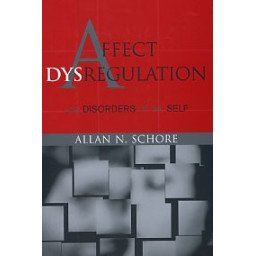- -50%



Building on his landmark work from 1994, Affect Regulation and the Origin of the Self, Allan Schore revisits his earlier findings, draws on his expansive ongoing theoretical rese ...

Security policy

Delivery policy

Return policy
Building on his landmark work from 1994, Affect Regulation and the Origin of the Self, Allan Schore revisits his earlier findings, draws on his expansive ongoing theoretical research, and develops his understanding of affect and the implicit self in this new book. This first volume in Schore's comprehensive treatment of affect, regulation, and human development, Affect Dysregulation and Disorders of the Self, brings together nine seminal contributions in the areas of neuroscience and neuropsychiatry.
An internationally recognized scientist, Schore has ventured into and had an impact upon a number of fields, including developmental psychopathology, psychiatry, neuroscience, and psychoanalysis. His areas of focus .have been as wide ranging, encompassing the emotions, attachment, and trauma. Because of his interdisciplinary approach, Schore's writings have appeared in a variety of journals and theoretical scientists and clinicians in these different disciplines may not have noted the unity and coherence of Schore's regulation theory. This volume and its companion, Affect Regulation and the Repair of the Self, correct this possible oversight by bringing together the overarching span of Schore's past and recent integrative work on affect regulation and dysregulation. Considered together, these two volumes show both the breadth of his theoretical models and the practical import of his findings. One notable example is early prevention programs that address infant care in the prenatal and postnatal periods? the periods in which the human brain exhibits the greatest degree of plasticity.
In Part I, Developmental Affective Neuroscience, Schore updates attachment theory by defining it as a regulation theory. He details the positive impact of early affective communications on the organization of a control system in the infant's developing right brain. Because the right hemisphere is dominant for the processing of social, emotional, and bodily information, the relationally-influenced development and organization of this hemisphere has profound effects on a person's capacity for empathy, attention, and coping with stress. The strength of Schore's conclusions in this area is increased by the astonishing advances in the neurosciences, particularly brain imaging. A large number of these studies are cited here. Revising classic neuroscience in light of these new, technically-driven data, Schore presents a compelling and thought-provoking model of the relations between dynamic organizations of the right brain and essential adaptive human functions.
A full-color insert illustrates the science upon which Schore draws. Figures, charts, and color brain scans elucidate the complex neuroscientific research and give evidence of the radical technological breakthroughs that spurred on researchers during the Decade of the Brain, and beyond.
The second part of this volume, Developmental Neuropsychiatry, focuses on abnormal development and describes the negative impact of relational trauma on the developmental trajectory of the right brain. Schore, a clinician-scientist, models both the origins of different forms of affect dysregulation that characterize various psy-chopathologies and the intergenerational transmission of a predisposition to severe personality disorders. The totality of his work intriguingly suggests that the nonverbal right, and not the verbal left hemisphere, is dominant in basic human adaptive functions, and that impaired right brain functions lie at the core of all psychopathologies.
Like the data he draws upon, Schore's findings address numerous disciplines, from neuroscience to psychology, psychiatry, psychoanalysis, pediatrics, psychosomatic medicine, education, and social work. The complex biopsychosocial model that emerges from Schore's research highlights the integrative character of the biological and the psychological realms in early development and over the course of the human lifespan. Medicine, social services, or public policy cannot be properly considered or reasonably effective in the absence of the rich perspective of human development advanced here.
Data sheet
Specific References
Comments (0)